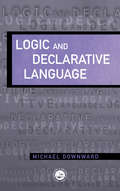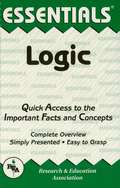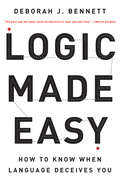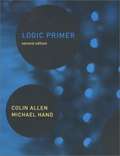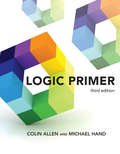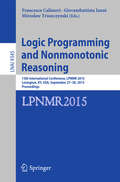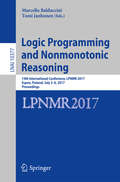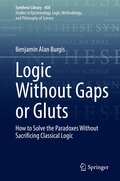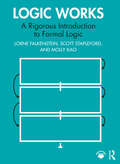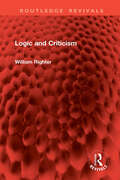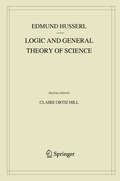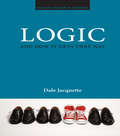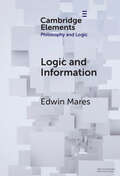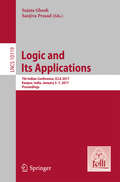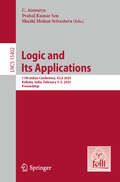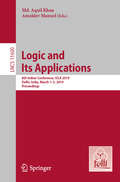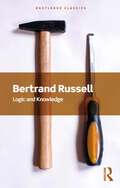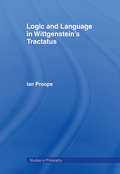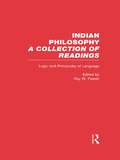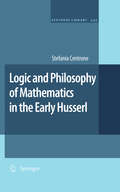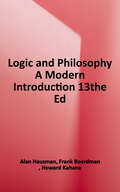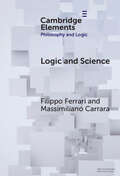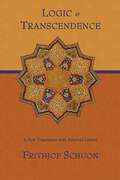- Table View
- List View
Logic And Declarative Language
by M. DownwardLogic has acquired a reputation for difficulty, perhaps because many of the approaches adopted have been more suitable for mathematicians than computer scientists. This book shows that the subject is not inherently difficult and that the connections between logic and declarative language are straightforward. Many exercises have been included in the hope that these will lead to a much greater confidence in manual proofs, therefore leading to a greater confidence in automated proofs.
Logic Essentials
by W. Kent WilsonREA's Essentials provide quick and easy access to critical information in a variety of different fields, ranging from the most basic to the most advanced. As its name implies, these concise, comprehensive study guides summarize the essentials of the field covered. Essentials are helpful when preparing for exams, doing homework and will remain a lasting reference source for students, teachers, and professionals. Logic covers the basic concepts of logic, including sentences, arguments, and the evaluation of arguments. This book will give the reader a clear understanding of sentence logic such as symbolization, semantics, and truth trees by giving concise definitions and examples of each.
Logic Made Easy: How to Know When Language Deceives You
by Deborah J. Bennett"The best introduction to logic you will find."--Martin Gardner "Professor Bennett entertains as she instructs," writes Publishers Weekly about the penetrating yet practical Logic Made Easy. This brilliantly clear and gratifyingly concise treatment of the ancient Greek discipline identifies the illogical in everything from street signs to tax forms. Complete with puzzles you can try yourself, Logic Made Easy invites readers to identify and ultimately remedy logical slips in everyday life. Designed with dozens of visual examples, the book guides you through those hair-raising times when logic is at odds with our language and common sense. Logic Made Easy is indeed one of those rare books that will actually make you a more logical human being.
Logic Primer
by Colin Allen Michael Hand<P>Logic Primer presents a rigorous introduction to natural deduction systems of sentential and first-order logic.<P> The text is designed to foster the student-instructor relationship. <P>The key concepts are laid out in concise definitions and comments, with the expectation that the instructor will elaborate upon them. <P>New to the second edition is the addition of material on the logic of identity in chapters 3 and 4.<P> An innovative interactive Web site, consisting of a "Logic Daemon" and a "Quizmaster," encourages students to formulate their own proofs and links them to appropriate explanations in the book.
Logic Primer, third edition
by Colin Allen Michael HandThe new edition of a comprehensive and rigorous but concise introduction to symbolic logic.Logic Primer offers a comprehensive and rigorous introduction to symbolic logic, providing concise definitions of key concepts, illustrative examples, and exercises. After presenting the definitions of validity and soundness, the book goes on to introduce a formal language, proof theory, and formal semantics for sentential logic (chapters 1–3) and for first-order predicate logic (chapters 4–6) with identity (chapter 7). For this third edition, the material has been reorganized from four chapters into seven, increasing the modularity of the text and enabling teachers to choose alternative paths through the book. New exercises have been added, and all exercises are now arranged to support students moving from easier to harder problems. Its spare and elegant treatment makes Logic Primer unique among textbooks. It presents the material with minimal chattiness, allowing students to proceed more directly from topic to topic and leaving instructors free to cover the subject matter in the way that best suits their students. The book includes more than thirty exercise sets, with answers to many of them provided in an appendix. The book&’s website allows students to enter and check proofs, truth tables, and other exercises interactively.
Logic Programming and Nonmonotonic Reasoning
by Francesco Calimeri Giovambattista Ianni Miroslaw TruszczynskiThis volume contains the refereed proceedings of the 13th International Conference on Logic Programming and Nonmonotonic Reasoning, LPNMR 2015, held in September 2015 in Lexington, KY, USA. The 290long and 11 short papers presented together with 3 invited talks, the paper reporting on the Answer Set Programming competition, and four papers presented by LPNMR student attendees at the doctoral consortium were carefully reviewed and selected from 60 submissions. LPNMR is a forum for exchanging ideas on declarative logic programming, nonmonotonic reasoning, and knowledge representation. The aim of the LPNMR conferences is to facilitate interactions between researchers interested in the design and implementation of logic-based programming languages and database systems, and researchers who work in the areas of knowledge representation and nonmonotonic reasoning.
Logic Programming and Nonmonotonic Reasoning
by Marcello Balduccini Tomi JanhunenThis Festschrift volume, published in honor of Michael Gelfond on the occasion of his 65th birthday, contains a collection of papers written by his closest friends and colleagues. Several of these papers were presented during the Symposium on Constructive Mathematics in Computer Science, held in Lexington, KY, USA on October 25-26, 2010. The 27 scientific papers included in the book focus on answer set programming. The papers are organized in sections named "Foundations: ASP and Theories of LP, KR, and NMR", "ASP and Dynamic Domains", and "ASP - Applications and Tools".
Logic Without Gaps or Gluts: How to Solve the Paradoxes Without Sacrificing Classical Logic (Synthese Library #458)
by Benjamin Alan BurgisThis book offers a defense against non-classical approaches to the paradoxes. The author argues that, despite appearances, the paradoxes give no reason at all to reject classical logic. In fact, he believes classical solutions fare better than non-classical ones with respect to key tests like Curry’s Paradox, a Liar-like paradox that dialetheists are forced to solve in a way totally disjoint from their solution to the Liar. Graham Priest’s In Contradiction was the first major work that advocated the use of non-classical approaches. Since then, these views have moved into the philosophical mainstream. Much of this movement is fueled by a widespread sense that these logically heterodox solutions get to the real nub of the issue. They lack the ad hoc feel of many other solutions to the paradoxes. The author believes that it's long past time for a response to these attacks against classical orthodoxy. He presents a non-logically-revisionary solution to the paradoxes. This title offers a literal way of cashing out the disquotation metaphor. While the details of the view are novel, the idea has a pre-history in the relevant literature. The author examines objections in detail. He rejects each in turn and concludes by comparing the virtues of his logically orthodox approach with those of the paraconsistent and paracomplete competition.
Logic Works: A Rigorous Introduction to Formal Logic
by Scott Stapleford Lorne Falkenstein Molly KaoLogic Works is a critical and extensive introduction to logic. It asks questions about why systems of logic are as they are, how they relate to ordinary language and ordinary reasoning, and what alternatives there might be to classical logical doctrines. The book covers classical first-order logic and alternatives, including intuitionistic, free, and many-valued logic. It also considers how logical analysis can be applied to carefully represent the reasoning employed in academic and scientific work, better understand that reasoning, and identify its hidden premises. Aiming to be as much a reference work and handbook for further, independent study as a course text, it covers more material than is typically covered in an introductory course. It also covers this material at greater length and in more depth with the purpose of making it accessible to those with no prior training in logic or formal systems. Online support material includes a detailed student solutions manual with a running commentary on all starred exercises, and a set of editable slide presentations for course lectures. Key Features Introduces an unusually broad range of topics, allowing instructors to craft courses to meet a range of various objectives Adopts a critical attitude to certain classical doctrines, exposing students to alternative ways to answer philosophical questions about logic Carefully considers the ways natural language both resists and lends itself to formalization Makes objectual semantics for quantified logic easy, with an incremental, rule-governed approach assisted by numerous simple exercises Makes important metatheoretical results accessible to introductory students through a discursive presentation of those results and by using simple case studies
Logic and Algebraic Structures in Quantum Computing
by Jennifer Chubb Ali Eskandarian Valentina HarizanovArising from a special session held at the 2010 North American Annual Meeting of the Association for Symbolic Logic, this volume is an international cross-disciplinary collaboration with contributions from leading experts exploring connections across their respective fields. <P><P>Themes range from philosophical examination of the foundations of physics and quantum logic, to exploitations of the methods and structures of operator theory, category theory, and knot theory in an effort to gain insight into the fundamental questions in quantum theory and logic. The book will appeal to researchers and students working in related fields, including logicians, mathematicians, computer scientists, and physicists. A brief introduction provides essential background on quantum mechanics and category theory, which, together with a thematic selection of articles, may also serve as the basic material for a graduate course or seminar.
Logic and Criticism (Routledge Revivals)
by William RighterFirst Published in 1963, Logic and Criticism makes one of the rare attempts since that of I.A. Richard’s Principles of Literary Criticism to examine the problems of criticism in the light of recent philosophical developments. The character of critical language and argument, the problem of judgement, the relevance or irrelevance of moral criteria, are considered in detail through examples drawn from the most important modern critics. Above all the work is concerned with the question of how logical or illogical an activity criticism is, and the conclusions drawn have great relevance to current critical discussion. This is a must read for scholars and researchers of philosophy and literature.
Logic and General Theory of Science (Husserliana: Edmund Husserl – Collected Works #15)
by Edmund HusserlThe stated subject of these lecture courses given by Husserlbetween 1910 and 1918is ‘reason, the word for the mental activities and accomplishments that govern knowledge, give it form and supply it with norms.’They show their author still pursuing the course set out in the Logical Investigations up to the end of the second decade of the century and displaying utter consistency with stands that he began taking on meaning, analyticity, Platonism, manifolds, mathematics, psychologism, etc. in the 1890s. Thus, they undermine many idées reçues about the development of his thought. The centerpiece of this work is an exploration of the realm of meaning.Moreover, they add new dimensions to standard discussions by taking readers back to the place where phenomenology and analytic philosophy diverged. They show that Husserl tangled long and hard with the very ideas that went into the making of the latter and offer a wealth of interesting insights into sense and meaning, theory of judgment, complete and incomplete meanings, states of affairs, extensional logic, the relationship between logic and mathematics, functions and arguments, propositional functions, quantification, existential generalization, the word ‘all,’ number theory, sets, modality, deductive theory, ideas that are still under discussion today.Prepared for oral delivery in the classroom, they are refreshingly lively and spontaneous. They are clearer, more explicit, and readable than the books Husserl published during his lifetime.
Logic and How it Gets That Way (Acumen Research Editions Ser.)
by Dale JacquetteIn this challenging and provocative analysis, Dale Jacquette argues that contemporary philosophy labours under a number of historically inherited delusions about the nature of logic and the philosophical significance of certain formal properties of specific types of logical constructions. Exposing some of the key misconceptions about formal symbolic logic and its relation to thought, language and the world, Jacquette clears the ground of some very well-entrenched philosophical doctrines about the nature of logic, including some of the most fundamental seldom-questioned parts of elementary propositional and predicate-quantificational logic. Having presented difficulties for conventional ways of thinking about truth functionality, the metaphysics of reference and predication, the role of a concept of truth in a theory of meaning, among others, Jacquette proceeds to reshape the network of ideas about traditional logic that philosophy has acquired along with modern logic itself. In so doing Jacquette is able to offer a new perspective on a number of existing problems in logic and philosophy of logic.
Logic and Information (Elements in Philosophy and Logic)
by Edwin MaresThis Element looks at two projects that relate logic and information: the project of using logic to integrate, manipulate and interpret information and the proect of using the notion of information to provide interpretations of logical systems. The Element defines 'information' in a manner that includes misinformation and disinformation and uses this general concept of information to provide an interpretation of various paraconsistent and relevant logics. It also integrates these logics into contemporary theories of informational updating, probability theory and (rather informally) some ideas from the theory of the complexity of proofs. The Element assumes some prior knowledge of modal logic and its possible world semantics, but all the other necessary background is provided.
Logic and Its Applications
by Sanjiva Prasad Sujata GhoshThis book collects the refereed proceedings of the 7th Indian Conference on Logic and Its Applications, ICLA 2017, held in Mumbai, India, in January 2017. The volume contains 13 full revised papers along with 4 invited talks presented at the conference. The aim of this conference series is to bring together researchers from a wide variety of fields in which formal logic plays a significant role. Areas of interest include mathematical and philosophical logic, computer science logic, foundations and philosophy of mathematics and the sciences, use of formal logic in areas of theoretical computer science and artificial intelligence, logic and linguistics, and the relationship between logic and other branches of knowledge. Of special interest are studies in systems of logic in the Indian tradition, and historical research on logic.
Logic and Its Applications: 11th Indian Conference, ICLA 2025, Kolkata, India, February 3–5, 2025, Proceedings (Lecture Notes in Computer Science #15402)
by Shashi Mohan Srivastava C. Aiswarya Prabal Kumar SenThis book constitutes the refereed proceedings of the 11th Indian Conference on Logic and Its Applications, ICLA 2025, held in Kolkata, India, during February 3–5, 2025. Four out the five invited talks are included in this book. Out of the 26 submissions, the program committee carefully selected 14 papers to be included in the proceedings. The topics included are Mathematics, Computer Science, Philosophy, Linguistics and Cognitive Science. A special feature of ICLA is the inclusion of studies in systems of logic in the Indian tradition, as well as historical research on logic.
Logic and Its Applications: 8th Indian Conference, ICLA 2019, Delhi, India, March 1-5, 2019, Proceedings (Lecture Notes in Computer Science #11600)
by Md. Aquil Khan Amaldev ManuelThis book collects the refereed proceedings of the 8th Indian Conference on Logic and Its Applications, ICLA 2019, held in Delhi, India, in March 2019. The volume contains 13 full revised papers along with 6 invited talks presented at the conference. The aim of this conference series is to bring together researchers from a wide variety of fields in which formal logic plays a significant role. Areas of interest include mathematical and philosophical logic, computer science logic, foundations and philosophy of mathematics and the sciences, use of formal logic in areas of theoretical computer science and artificial intelligence, logic and linguistics, and the relationship between logic and other branches of knowledge. Of special interest are studies in systems of logic in the Indian tradition, and historical research on logic.
Logic and Knowledge (Routledge Classics)
by Bertrand RussellBertrand Russell's writings on logic, metaphysics, philosophy of language and epistemology are among the most influential of the twentieth century. Logic and Knowledge presents Russell's very best and most important work on these topics in a single volume, which by placing philosophical logic at its core was of monumental importance in shaping the path of analytical philosophy. It includes classics such as 'On Denoting', one of the founding pieces of philosophy of the twentieth century as well as chapters on logical atomism, a term coined by Russell himself to describe his view that the world consists in a plurality of independent entities, which by coming together form facts.Along with other essays on fundamental philosophical problems including the logic of relations, universals and particulars, and propositions, Logic and Knowledge shows why Russell remains one of the most important philosophers of the last century.This Routledge Classics edition includes a new Foreword by Graham Stevens.
Logic and Language in Wittgenstein's Tractatus (Dissertations In Philosophy Ser.)
by Ian ProopsThis historical study investigates Ludwig Wittgenstein's early philosophy of logic and language, as it is presented in his Tractatus Logico-Philosophicus. The study makes a case for the Tractatus as an insightful critique of the philosophies of Bertrand Russell and Gottlob Frege-the Founding Fathers of analytic philosophy.
Logic and Language: Indian Philosophy (Problems Of Philosophy Ser. #Vol. 2)
by Roy PerrettFirst published in 2001. Routledge is an imprint of Taylor & Francis, an informa company.
Logic and Philosophy of Mathematics in the Early Husserl
by Stefania CentroneLogic and Philosophy of Mathematics in the Early Husserl focuses on the first ten years of Edmund Husserl's work, from the publication of his Philosophy of Arithmetic (1891) to that of his Logical Investigations (1900/01), and aims to precisely locate his early work in the fields of logic, philosophy of logic and philosophy of mathematics. Unlike most phenomenologists, the author refrains from reading Husserl's early work as a more or less immature sketch of claims consolidated only in his later phenomenology, and unlike the majority of historians of logic she emphasizes the systematic strength and the originality of Husserl's logico-mathematical work. The book attempts to reconstruct the discussion between Husserl and those philosophers and mathematicians who contributed to new developments in logic, such as Leibniz, Bolzano, the logical algebraists (especially Boole and Schröder), Frege, and Hilbert and his school. It presents both a comprehensive critical examination of some of the major works produced by Husserl and his antagonists in the last decade of the 19th century and a formal reconstruction of many texts from Husserl's Nachlaß that have not yet been the object of systematical scrutiny. This volume will be of particular interest to researchers working in the history, and in the philosophy, of logic and mathematics, and more generally, to analytical philosophers and phenomenologists with a background in standard logic.
Logic and Philosophy of Mathematics in the Early Husserl (Synthese Library #345)
by Stefania CentroneLogic and Philosophy of Mathematics in the Early Husserl focuses on the first ten years of Edmund Husserl’s work, from the publication of his Philosophy of Arithmetic (1891) to that of his Logical Investigations (1900/01), and aims to precisely locate his early work in the fields of logic, philosophy of logic and philosophy of mathematics. Unlike most phenomenologists, the author refrains from reading Husserl’s early work as a more or less immature sketch of claims consolidated only in his later phenomenology, and unlike the majority of historians of logic she emphasizes the systematic strength and the originality of Husserl’s logico-mathematical work. The book attempts to reconstruct the discussion between Husserl and those philosophers and mathematicians who contributed to new developments in logic, such as Leibniz, Bolzano, the logical algebraists (especially Boole and Schröder), Frege, and Hilbert and his school. It presents both a comprehensive critical examination of some of the major works produced by Husserl and his antagonists in the last decade of the 19th century and a formal reconstruction of many texts from Husserl’s Nachlaß that have not yet been the object of systematical scrutiny. This volume will be of particular interest to researchers working in the history, and in the philosophy, of logic and mathematics, and more generally, to analytical philosophers and phenomenologists with a background in standard logic.
Logic and Philosophy: A Modern Introduction
by Alan Hausman Frank Boardman Howard KahaneA comprehensive introduction to formal logic, this is a rigorous yet accessible text, appropriate for students encountering the subject for the first time. Great, carefully crafted exercise sets accompanied by a straightforward, engaging exposition built to an exploration of sentential logic, first-order predicate logic, the theory of descriptions, identity, relations, set theory, modal logic, and Aristotelian logic. And as its title suggests, Logic and Philosophy are devoted not only to logic but also to the philosophical debates that led to the development of the field. <p><p>Much new material has been added for the 13th edition. An introduction to set theory and its relationship to logic and mathematics, including philosophical issues, is now part of Chapter 13. Chapter 15 is an introduction to modal logic and Kripke semantics, concluding with a discussion of philosophical problems with any logical accommodation of modalities. Instructors who do not wish to present proof methods will find chapters on truth trees for both sentential and first-order logic and a presentation of trees for modal logic. <p><p>Special features of this text include presentations of the history of logic, alternatives to traditional methods of conditional and indirect proof, and a discussion of semantic problems with universal and existential instantiations. Throughout, the authors are sensitive to philosophical issues that arise from the relationship between ordinary language, symbolic logic, and justifications for the syntax and semantics of the various symbolic languages. Discussions range from the justification of the truth table for the sentential rendering of if . . . then statements to semantic and syntactic paradoxes, including some troubling contradictions that arise in ordinary language (e.g., the so-called hangman or surprise quiz paradox). <p><p>Logic and Philosophy includes ample material for a one-semester or two-semester course and provides a thorough preparation for more advanced logic courses.
Logic and Science: An Exploration of Logical Anti-Exceptionalism (Elements in Philosophy and Logic)
by Massimiliano Carrara Filippo FerrariThis Element delves into the relationship between logic and the sciences, a topic brought to prominence by Quine, who regarded logic as methodologically and epistemologically akin to the sciences. For this reason, Quine is seen as the forefather of anti-exceptionalism about logic (AEL), a stance that has become prevalent in the philosophy of logic today. Despite its popularity and the volume of research it inspires, some core issues still lack clarity. For one thing, most works in the debate remain vague on what should count as logic and what should count as a science. Furthermore, the terms of the comparison are rarely specified and discussed in a systematic way. This Element purports to advance the debate on these crucial issues with the hope of fostering our understanding of the fundamentals of AEL. This title is also available as Open Access on Cambridge Core.
Logic and Transcendence: A New Translation with Selected Letters
by Frithjof SchuonIn this new edition of his most important philosophical work, Frithjof Schuon confronts the pitfalls of rationalism and relativism within modern philosophy. This new edition comprises a fully revised translation from the French original and contains an extensive Appendix with previously unpublished letters and other private writings.
